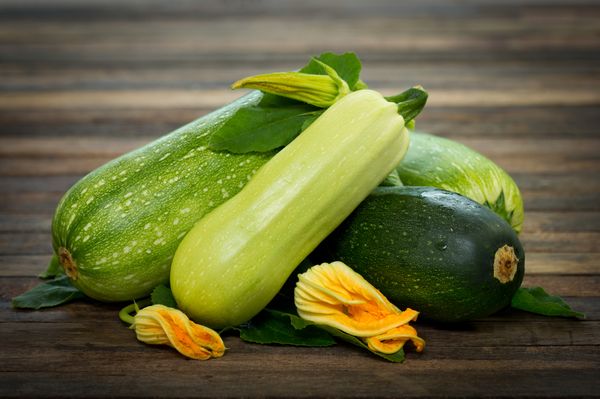Without the zucchini hard to imagine a vegetable garden. This vegetable is one of the first ready to be harvested and appears on the tables in the form of various dishes. The ease of growing zucchini, availability, precocity and other characteristics allow for proper care to grow these plants of different varieties in open ground, hotbeds and greenhouses in Siberia, the Moscow region and in the Leningrad region.
Table of contents
Variety of zucchini variety
Our grandmothers did not think much about the varietal characteristics of the cultivated plants and from year to year they collected their seeds from the best fruits. Sometimes a new variety appeared at the site, but its main characteristic was color spectrum fruits: white, green, yellow, etc. with
The arsenal of modern gardeners is much wider and the color range as a sign faded into the background. Attention is paid to such characteristics as:
- Maturing terms (early, average, late);
- Growth type (bush, climbing);
- Peculiarities of pollination (parthenocarpic or pollinated by insects);
- Productivity
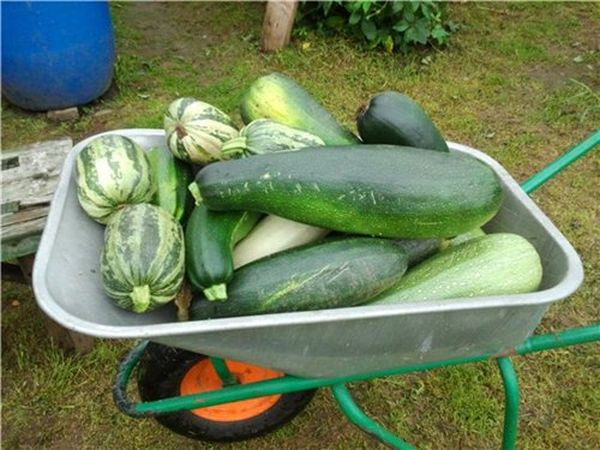
Among the variety of zucchini should be given special attention to the varieties that have earned the recognition of breeders and are most popular among gardeners. Each group has its own favorites.Someone is comfortable because of their ripening, and someone conquers its compactness.
The best varieties of bush type for cultivation in the open field
Most asthenia of the pumpkin family form a long spreading scourgewhich require large areas. At the same time, modern summer residents and gardeners are often limited to 6 acres, on which they want to plant a variety of crops.
The limited space and economy of each meter makes the planting of traditional climbing varieties a real luxury, but the bush ones become a godsend for such sites.
Canned squash can easy to fit into tight spaces and even plant in a bed of flowers, where large leaves will be the perfect backdrop for other plants.
Aeronaut
Fruits are green, 14-15 cm long, tasty, universal purpose. Perfectly withstand transportation. In compliance with the rules of agricultural technology from 1 square. m square can be collected 7-7.5 kg.
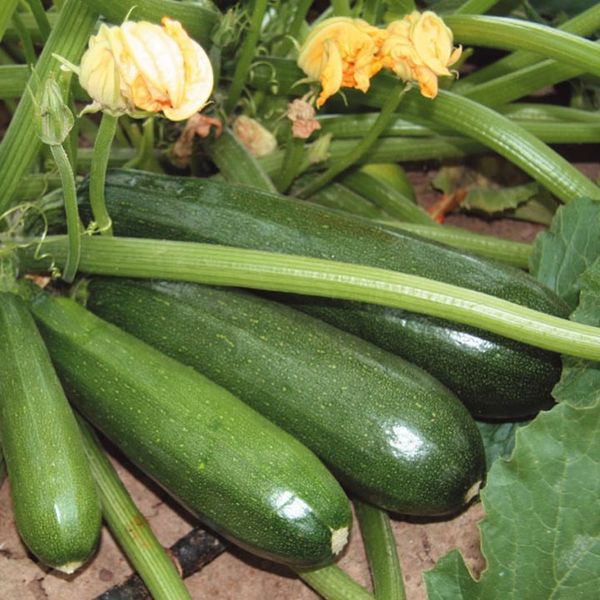
White
Ultra early. The first fruits are ready to be collected within 35-40 days. Fruits are white, oval, of excellent taste, universal purpose. The flesh is thick, cream. Well kept.
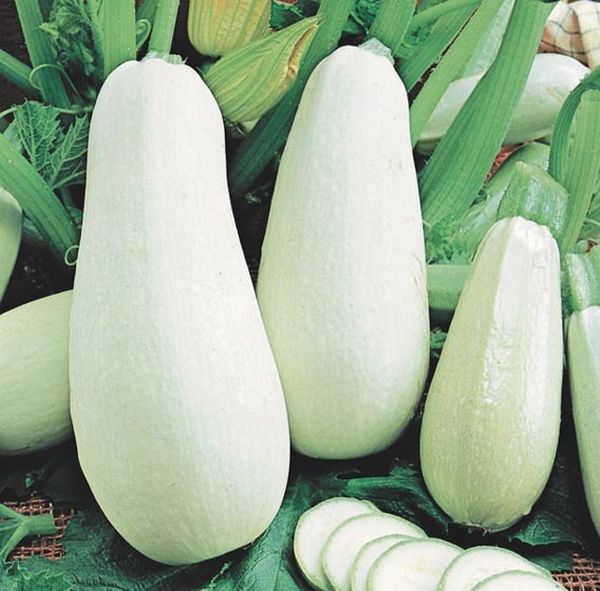
Waterfall
Early maturing hybrid. Fruits weighing up to 500 g, green.The flesh is thick, white. Productivity is high. Disease resistance is above average.
Odessa
Early bush type. Disease resistance is very high. Fruits are pale green, cylindrical. The flesh is pinkish yellow or light yellow. Suitable for canning.
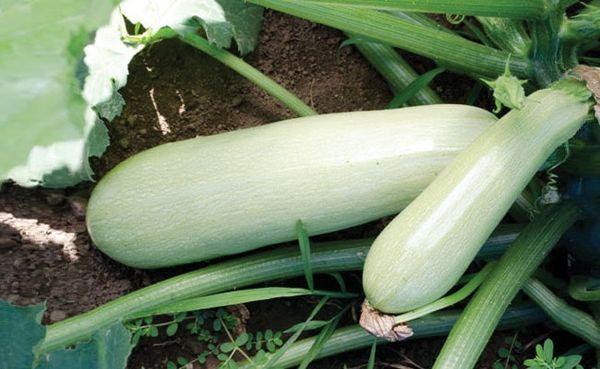
The best self-pollinated parthenocarpic species
Squash forms female and male flowers. In most cases, pollination and fruit setting occurs. with insectsthat carry pollen. However, when grown in greenhouses, especially in winter, cross-pollination is problematic.
Kavili
Early ripening and high yield make a hybrid Kavili one of the best.
Fruits are light green, up to 22 cm long. Fruiting is plentiful and long lasting. The ripening period is 1.5 months, and the active setting of new fruits lasts for 2 months in any conditions, even without the participation of pollinating insects. During this time, from 1 square. m manages to collect about 9 kg. The flesh is tender, juicy, whitish.
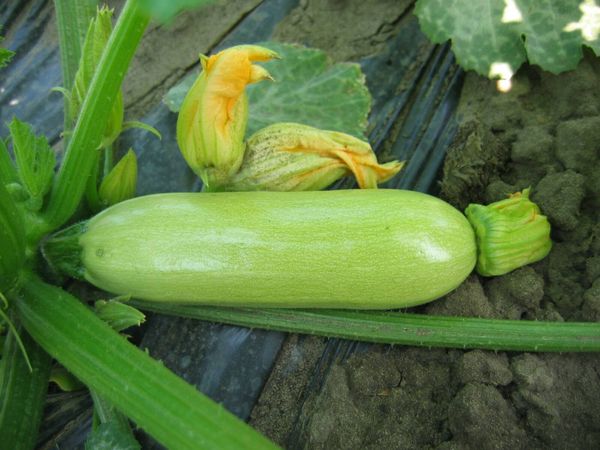
Jellyfish
Superearly hybrid. Ideal for the production of early products under the film shelters. Maintains the big differences of temperatures.
The ripening period is 35 days. Fruits are light green, with delicate skin. The pulp is dense, the seed chamber is miniature. The mass of the fetus can reach 800 g, with a length of 25 cm.
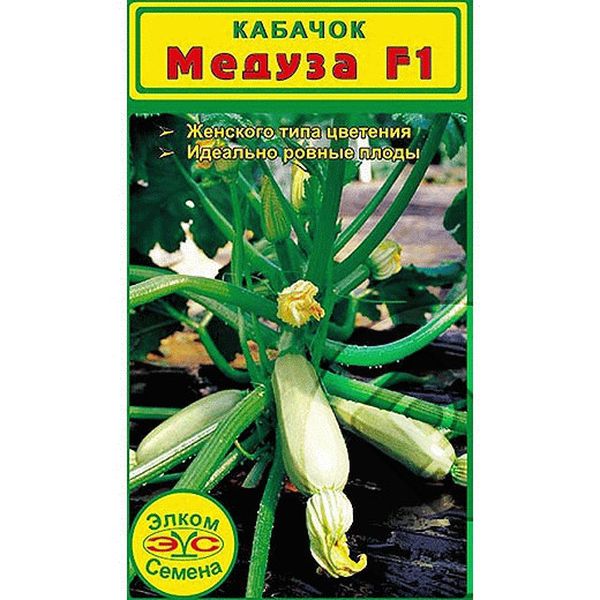
Parthenon
Hybrid Dutch selection, very compact and fruitful. On 1 square. m can accommodate 3-4 bush and collect up to 15 kg fruits. Good fruit stitching without the participation of insects and early ripening make this variety an excellent candidate for planting in greenhouses.
The fruits of the variety are dark green, cylindrical with light green dense, juicy and tasty pulp. It can be used not only for canning and cooking various dishes, but also to eat it raw. Zucchini fruiting period very long and can stretch until September.
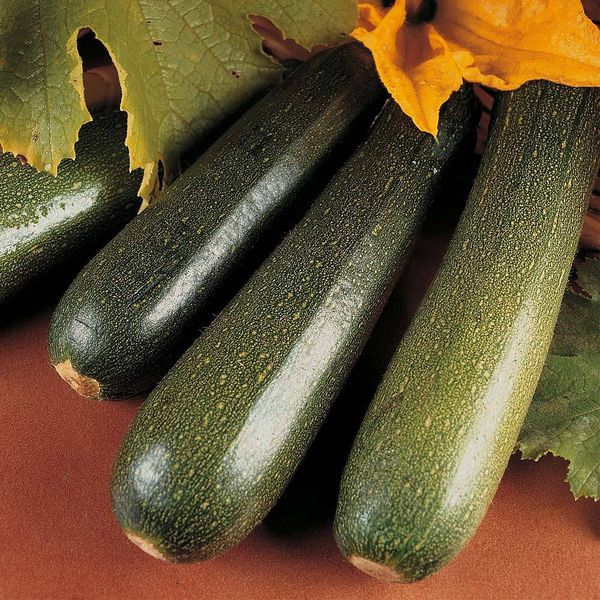
Early varieties
Varieties of zucchini early ripening have a special value, because they most often become the first fresh vegetables of the new summer season.
Iskander
Early ripe parthenokarpichesky hybrid, bred by Dutch breeders.Ripening period 40-45 days.
When planting 4 plants per 1 square. m yield is 15 kg. Fruit Iskander light green, up to 20 cm long, with a thin delicate skin. The flesh is tender, juicy, cream or white.
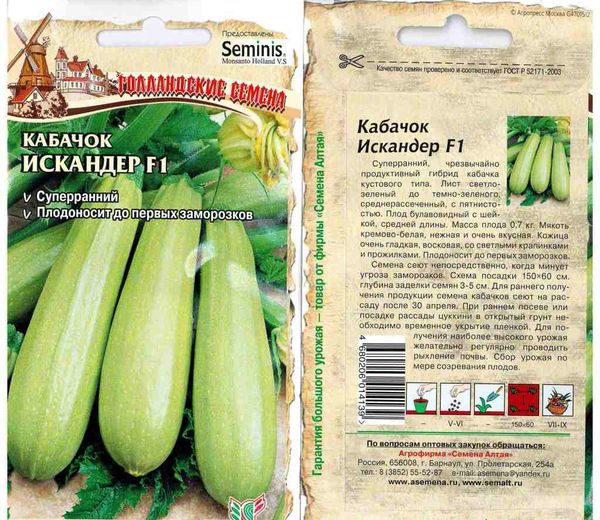
Tsukesh
Term ripening varieties Tsukesh is 41-50 days. The plant is characterized by large dark green leaves with gray spots. These are varietal features of coloring and should not be confused with the disease.
Fruits up to 40 cm long and weighing up to 900 g. Fruiting continues until frost. Fruit well stored and transported. The flesh is juicy, very tasty.
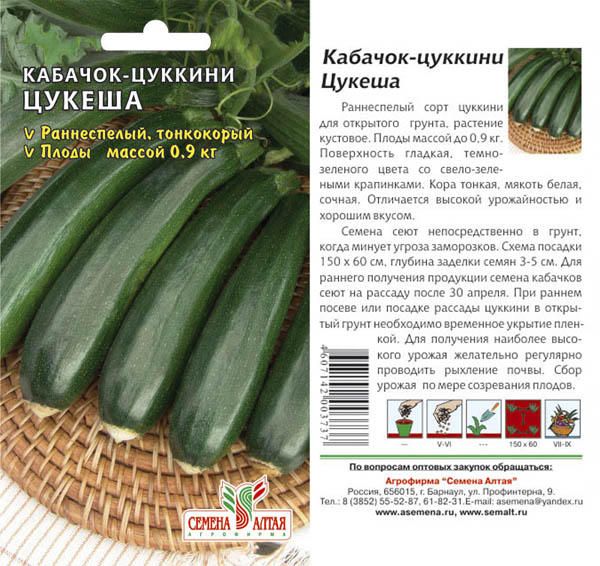
Ball
The main feature of the variety are green spherical fruits covered with light dots that look like a ball. The taste of the pulp is excellent.
The term of ripening of the zucchini is 50-55 days. The plant is compact, bush with strongly dissected leaves.
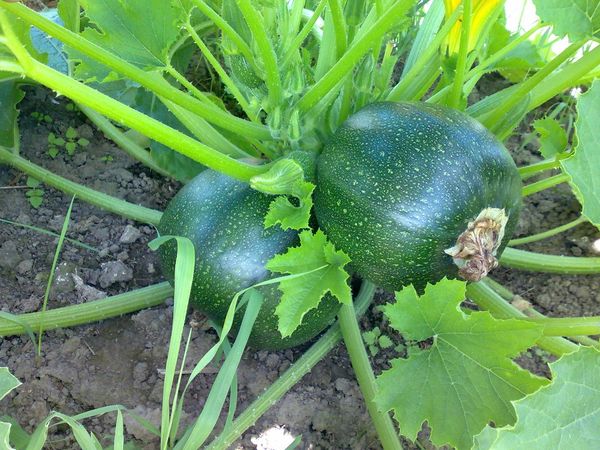
Aeronaut
This variety has already been mentioned as a popular bush zucchini, but the early ripening period is another plus in the piggy bank of positive characteristics.Ripening period 42-45 days.
Medium ripening
Gribovsky
Widely known white variety Gribovsky. Maturation term not less than 46 days depending on the region of cultivation. Plant forms long lashes.
Fruits up to 20 cm in size, white. The skin is firm, the pulp is tasty, white or yellowish. Yield 8.5 kg from 1 square. m
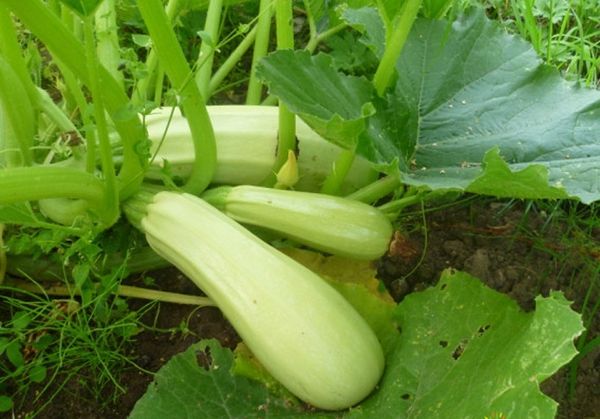
Zolotinka
The ripening period is 50 days. Bush type growth. The color of the fruit is fully consistent with the name.
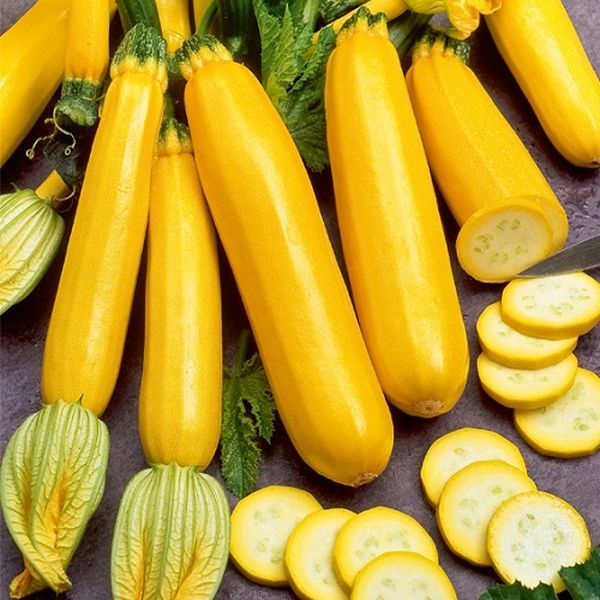
Black handsome
Shrub grade. Ripens in 45 days. Fruits are very dark green, close to black. The rind is thin, the flesh is greenish, delicate taste.
The fruits are universal and suitable for all possible uses. At the same time on the bush can be tied by 4-5 fruits.
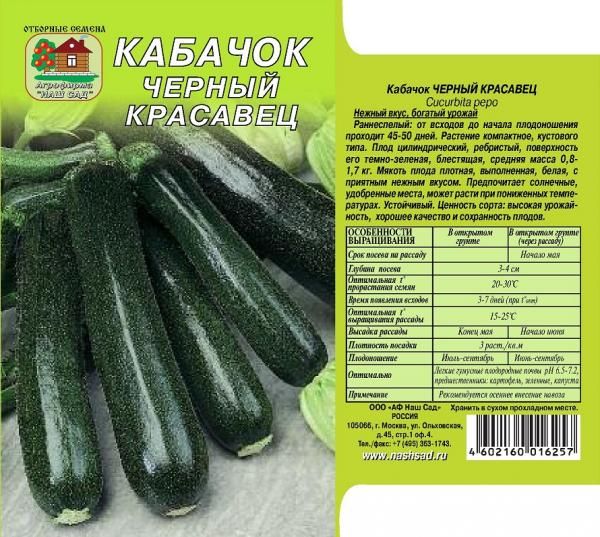
Late zucchini
Spaghetti
Young zucchini Spaghetti does not differ in taste from the usual varieties, but after full ripening, the zucchini flesh is stratified into fibers and a kind of vegetable spaghettiwhich has a lot of fans. Externally ripe fruits in shape and color resemble small melons.
The only problem - late ripening, which in regions with a short summer does not always allow to wait for “macaroni”.
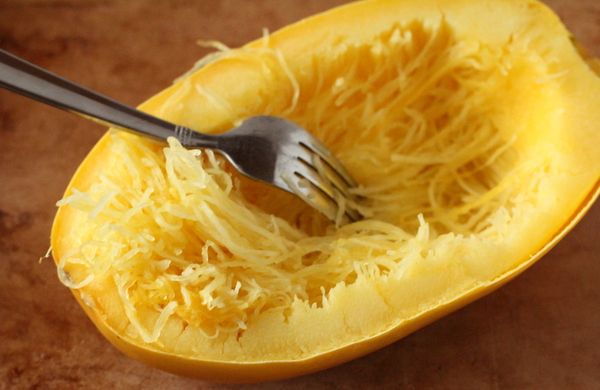
Lagenaria (Kalebasa)
This type of pumpkin is also called Vietnamese zucchini. Due to the long period of ripening and exoticism, Lagenaria cannot be called a frequent visitor to the gardens. The shape of the fruit varies.
In the young form they are used in food as well as pumpkin or zucchini. In the ripe state, the walls and flesh dry out and a cavity is formed inside.
Traditionally, this plant, some people used to make vessels.
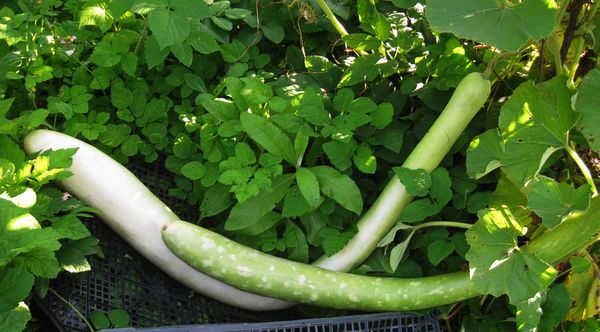
The variety of zucchini allows you to choose a suitable variety not only for certain growing conditions, but also for aesthetic and taste reasons.
With the right combination of hybrids, you can get a good harvest even from a small area and extend the period of fruiting. And some exotic varieties will help to add variety to traditional culinary dishes and grow material for handicrafts.
